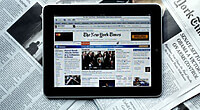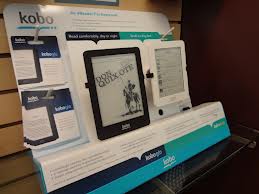Many bookstore chains in Canada and the US do not actively promote digital content in their stores. They bet on people coming in and spending more on the tangible versions of the books, but then customers end up buying the digital editions. Bookstores belonging to ABA or the UK Booksellers Association often get a cut out of each digital sale, but are doing little to gain that revenue other than pushing Kobo e-readers. Indie bookstores should be promoting digital discovery in their shops with QR codes and Kobo should be assisting them.
We have all seen QR codes in advertising across a wide spectrum. If you live in a major urban center you will undoubtedly see band posters and adverts on polls carry QR. The code easily allows people to scan it with their smartphone and be redirected to a specific website or an e-commerce store to buy some products. It is easy to set up and most people are familiar with what they have to do. It is more mainstream than NFC, which allows for greater flexibility in a retail setting.
Barnes and Noble is famous in the USA for its “More in Store” program. Basically, if you bring your Nook device into a retail outlet, you can connect up to free WIFI and read the full version of any ebooks as long as you remain in the store, and only for an hour a day.
Indie bookstores are filling the void with the recent Borders collapse and other chains scaling back and closing stores in unprofitable markets. The indie store, more than ever, is becoming the destination of choice to buy new books. Thousands of indies are operating in the US and UK and seldom do they employ a unified digital strategy.
Kobo is the company of choice that both countries’ bookselling associations have established a partnership with. Both organizations used to do business with Google until the beginning of 2013, but found that the hardware margins were slim and many people did not have access to Google Play. Kobo should be promoting digital discovery with indie bookstores by developing QR codes and free wireless internet to all participating ABA and UK bookshops.
Digital ebooks is one of the fastest growing segments and Penguin recently announced that 30% of its entire US revenue stems from them. There is a definitive shift to buying the electronic version, often to save money. The average hardcover is $30, while the ebook is often $9.99. Building more synergy between the physical bookstore and the digital realm is necessary to preserve the brick and motor retail scene. It is essential that retail stores adapt a stronger digital strategy instead of just hustling e-readers for a small hardware margin and digital books for longer term revenue. Indie stores should be appealing to people who have shifted to digital and encourage them to visit the store to get more benefits. After all, once you’re in a store, you might want a coffee, spot a magazine, or get some other little impulse buy.
Currently very few bookshops have free WIFI available for their patrons to use. Most indies do not use NFC or QR codes to aid in digital content discovery and this must change. You would be hard-pressed to go a week without hearing about another small store that has closed. Most lament that the shift to digital has killed their profit margins and longtime customers are no longer coming in. Kobo should be doing more for the various indie bookstores by rolling out a more comprehensive digital strategy and developing proper infrastructure. Right now they just give stores a discount on the hardware, and provide marketing materials and support. If they provided all participating stores with QR Code materials, WIFI, and NFC, it would unify the tangible and intangible in one location.
Michael Kozlowski is the editor-in-chief at Good e-Reader and has written about audiobooks and e-readers for the past fifteen years. Newspapers and websites such as the CBC, CNET, Engadget, Huffington Post and the New York Times have picked up his articles. He Lives in Vancouver, British Columbia, Canada.

